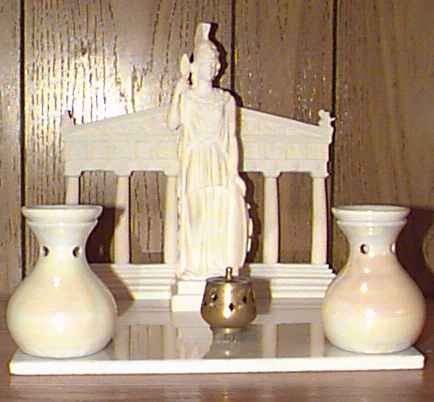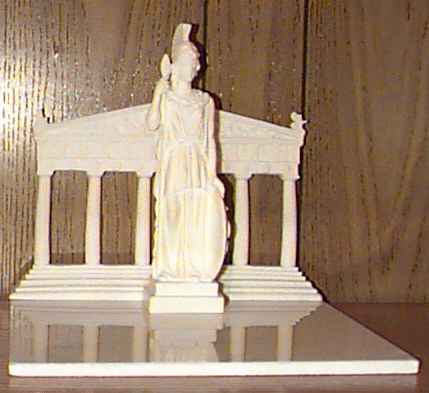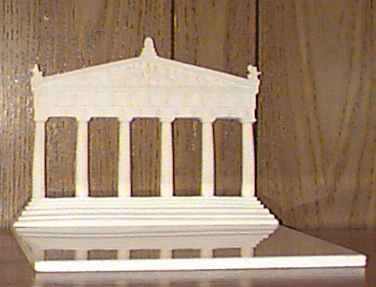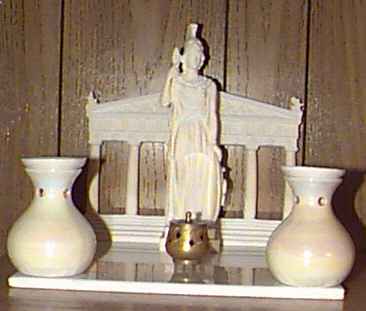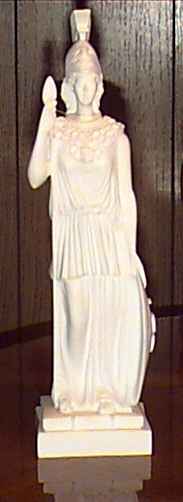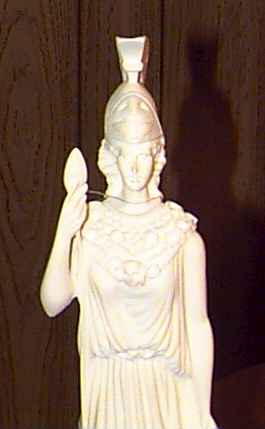|
Congratulations! You have found Zorba's Altar to the Goddess Athena.
What is an altar? Some basic explanations are in order, in order to convey a decent level of understanding. What is an altar, what is *this* altar, and probably most importantly, what *isn't* this altar! An altar is, in most religions/belief systems, first and foremost a focal point for the worshippers/adherents, etc. A place to give offerings, pray, meditate, be married, etc. Altars may be simple or complex; large or small. What an altar is NOT, in the vast majority of cases, is a place of sacrifice. With the exception of a couple of african-based traditions, most people feel sacrifices are obsolete, and meaningless in a modern context. This does not preclude symbolic offerings of incense, fruit, flowers, etc. This latter case may be found at many altars, I've seen several lovely Buddhist altars with incense and fruit, and Protestant Christian altars are often found bare except for a vase or bowl of flowers. Many people of various beliefs have altars in the home. This is a traditional practice in many eastern philosophies, and is frequently found in western practice as well. The altar may, or may not include an image of some type of the deity(ies) the altar is dedicated to.
What about images? This has been an ongoing debate since the beginning of time. Many will cry "idolatry" in reference to images of deities of any kind, others find them acceptable under certain circumstances, still others have no problem with them. The argument for images says they are merely a focal point, the deity in question certainly isn't the image; and therefore is NOT idolatry (if indeed, "idolatry" is something bad anyway). Personally, I find the whole argument a little silly, feeling it is something best left between the individual and their God(s).
This Altar This particular altar is in my home, dedicated to the Goddess Athena. It stands on a white marble base, and includes an small statue of Athena, an incense burner, and 2 candle vases. A miniature Greek temple facade serves as a backdrop. As in ancient times the public altar was located outside, in front of the temple; the whole effect is that of the Goddess Athena at Her altar in front of Her temple. As the image of Athena is slightly taller than the temple backdrop, the effect is enhanced. Incense is burned at this altar for 3 reasons:
The candle vases hold small "tea" candles to illuminate the altar at night (Through cutouts in the backside of the vases). Gives a very pretty, peaceful effect. In addition, scented water can be added to the little bowls on the top of the vases. The primary reason, however, is far more practical. Bare candles cannot be used due to the altar's location. There were black spots forming on the bottom of the shelf above the altar! The altar was relocated to a more photogenic location for these pictures. These pictures were taken with a digital camera. Although the camera was set on it's highest resolution, the pictures are barely adequate. In particular, the white powdered marble Athena and temple facade are not shown with justice.
Update!
This picture taken with an Olympus Stylus Epic film camera.
Hymns to Athena Here is a nice page with a couple of nice hymns to my Goddess. Linked to for copyright reasons. Worthwhile!
Prayer to Athena I am not much on "canned prayers", formal prayers, public prayers, etc. When I say my prayers, to Athena or to other deities, I prefer to improvise on the spot from my soul, what I feel. Canned prayers, regardless of how well intended tend to become a ritual rather than an "interactive experience" with meaning. Having said that, the following is the closest I've come to a canned prayer. I don't use it all the time, I don't even use it most of the time, and even when I do use it, it is likely to change character from what is presented here. Nevertheless, for the curious, here is a little something I wrote down when I was in a particularly worshipful mood one evening: A PRAYER TO THE GODDESS ATHENA Athena Parthenos - hear the prayer
Glorious Athena - Fill me with your
I prostrate myself at your feet, great Athene
Bless this house and all therein,
Help me uphold the ideals you stand for. Grant me ..... (as needed) Great Athena, I thank you for your blessings,
I also thank you .... (as needed) Euxaristw!
.... As can be seen, there is a lot of room for flexibility here. I also avoid (like the plague!) artificially archaic language so beloved by many. No thee and thou, no closing "So mote it be". I am of a mind to be able to address Her in Her "own language" as I learn more Greek, but in the modern form. As I am an avid Greek folk dancer, dance also plays a part in worship. I am currently learning "Belly Dance" also, I find this dance form to be very spiritual, I plan to incorporate it into my worship as well. Thank you for reading! -Zorba
|
